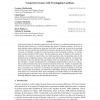Free Online Productivity Tools
i2Speak
i2Symbol
i2OCR
iTex2Img
iWeb2Print
iWeb2Shot
i2Type
iPdf2Split
iPdf2Merge
i2Bopomofo
i2Arabic
i2Style
i2Image
i2PDF
iLatex2Rtf
Sci2ools
114
click to vote
JAIR
2010
2010
Cooperative Games with Overlapping Coalitions
In the usual models of cooperative game theory, the outcome of a coalition formation process is either the grand coalition or a coalition structure that consists of disjoint coalitions. However, in many domains where coalitions are associated with tasks, an agent may be involved in executing more than one task, and thus may distribute his resources among several coalitions. To tackle such scenarios, we introduce a model for cooperative games with overlapping coalitions—or overlapping coalition formation (OCF) games. We then explore the issue of stability in this setting. In particular, we introduce a notion of the core, which generalizes the corresponding notion in the traditional (non-overlapping) scenario. Then, under some quite general conditions, we characterize the elements of the core, and show that any element of the core maximizes the social welfare. We also introduce a concept of balancedness for overlapping coalitional games, and use it to characterize coalition structures...
Related Content
| Added | 28 Jan 2011 |
| Updated | 28 Jan 2011 |
| Type | Journal |
| Year | 2010 |
| Where | JAIR |
| Authors | Georgios Chalkiadakis, Edith Elkind, Evangelos Markakis, Maria Polukarov, Nick R. Jennings |
Comments (0)

